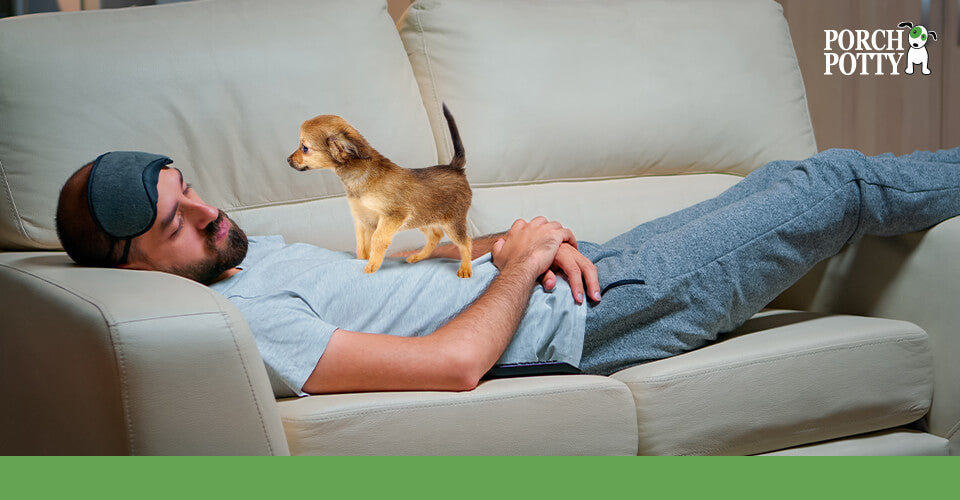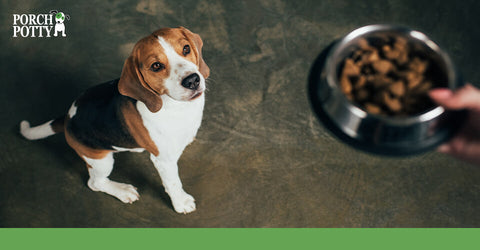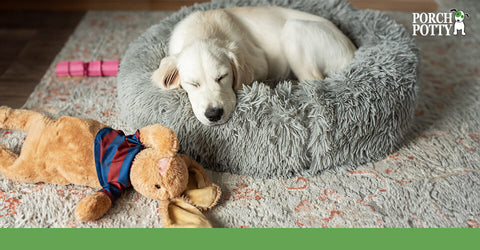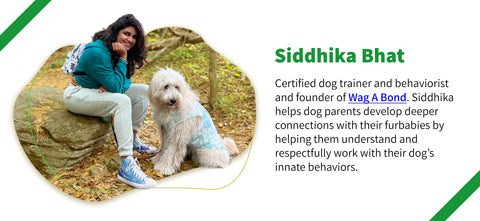
We all know that potty training is part of raising a puppy, even at night! We've got some tips to help you and your puppy rest without disrupting your potty routine.
You know you’re potty training your new puppy when you find your sleep schedule synced up with them. You both tend to fall asleep together and when they’re up, you’re up. It is a commonly known fact that dogs are creatures of habit and no one can stick to a routine better than them. It is really up to us to put their love for repetition to good use. Here is a quick guide to set up a night time routine for your dog that will bring both of you ample rest and a good night’s sleep.
Gauging Your Puppy’s Bladder Control Abilities
A puppy’s age, size, activity levels, water intake and training are a few factors that determine their bladder control abilities. Bladder control is a function of growth and development in puppies. They are not born with the ability to hold their pee/ poop through the night. Consistent and positive reinforcement-based training combined with a consistent routine helps the puppy learn where and when it's appropriate to eliminate.
Besides the behavioral signs they give you to let you know that they need to relieve themselves, the general calculation on how long a puppy can typically hold its bladder is the puppy’s age in no of months + 1, up to a maximum of about 8 hours for most adult dogs. Here’s a simple breakdown of how long a puppy can hold their bladder depending on their age–
- 2 months old: 3 hours
- 3 months old: 4 hours
- 4 months old: 5 hours
However, it should be noted that this calculation may or may not apply to every puppy in the specified age group. Some puppies may feel the need to relieve themselves much more often throughout the day.
What does your puppy really need at night for a good night’s sleep?
A puppy’s requirements are very simple and straightforward. They need familiarity; in terms of environment, routine, people and place. New puppies usually whine the first couple of nights because everything is new and unknown to them and they crave a sense of comfort and familiarity.
Build a routine from day 1 for your puppy and develop a robust and consistent schedule for feeding, playing, resting, walks, potty and sleeping. The more consistent you are, the faster they will settle into their new home and understand the ways of the household.
At night, provide your dog with a safe and secure place to rest such as the play pen or the crate. It is okay to provide a little extra TLC the first few nights to comfort your pup. However, avoid coddling your puppy too much every single night as they may get habituated to it and it may be difficult for you to keep up.
A Step By Step Guide On Creating a Nighttime Routine
An easy to follow and steady night time routine helps contribute to better sleep and overall well being of the dog. Here are 5 steps to create a night time routine your pup will actually love:
1. Provide calm and consistent sleeping arrangements from day 1
It is natural to want to comfort your pup the first couple of nights and allow them a little space next to you on bed. While this may be the best way to make them feel at ease during those initial days, it may not be the most ideal setting in the long run.
One of the most important things to do BEFORE getting a puppy home is to figure out living arrangements for the puppy and make changes in your home accordingly. Once you are clear in terms of where your puppy will eat, sleep, play, etc, it will be a lot easier for you to shape them into it. Your pup’s rest area must be cozy and inviting. Consider using pheromones and calming scents to further acclimatize your pup.
2. Limit water intake at least 2 hours prior to bedtime
It’s a no-brainer that more water intake means more the need to pee. Cutting back on water is one of the first and foremost things to be done to boost your pup’s bladder control at night.
Limit your dog’s activity levels at night to avoid his system from being overstimulated and getting too thirsty. If your dog does seem thirsty, a piece of ice or a frozen treat could do the trick.
Make sure to keep the water bowl away at least 2 hours before your puppy’s bed time.
3. The last potty break
Take your dog out to relieve themselves a few minutes before they hit the bed. No water supply in addition to an empty bladder should help your dog sleep soundly at night without the need to go.
Make sure to not over exert your dog during their last potty break. A quick walk should suffice. Overexertion may lead to your puppy being overstimulated at night, which may interfere with a good night’s rest.
The last potty break should ideally be a couple of hours after the last one and must happen just a few minutes before they tuck into their bed.
4. Importance of a bedtime ritual
Most of us find comfort in a bedtime routine. We engage in activities such as freshening up, reading, journaling, etc that help calm our minds and promote better sleep at night. Engaging in these activities every single night gets our mind ready to wind up the day and relax ourselves. A night time routine has a very similar effect on our dogs; more so because they are a lot more routine-driven than us.
Plan a series of calming activities for your dog before their bed time such as giving them a calming chew, engaging in a relaxing massage, cuddling, a quick and short pee walk, etc. This will help them calm down as bedtime approaches and sleep better at night. Once they are asleep, avoid making the departure a big event.
5. Middle-of-the-night potty breaks
The need for this should gradually go down as your puppy ages. A young puppy may feel the need to wake up multiple times in the middle of the night to pee or poop. This could be due to a multitude of reasons such as weak bladder control, absence of a schedule, an overstimulated mind or body, excessive water intake, etc.
Midnight potty breaks, while important during the initial phase, must not become a long-term habit as it may lead to disturbed sleep for both the dog and the humans. Attempt to train your dog out of it as soon as you possibly can.

Strategically planning your puppy's meals and water breaks can help set you up for success.
What is the best way to manage your pup’s diet and hydration for a restful night?
A restful night is a function of a whole day of timely meals, play, walks, rest and potty breaks. An excess or dearth of any essential activity may cause disruption. Puppies generally need to eat a lot more frequently than adult dogs because their energy reserves deplete and replenish at a drastic rate.
Provide access to water throughout the day, but consider limiting water intake in the evening, especially close to bedtime.
Select a high-quality, age-appropriate puppy food that meets your pup's nutritional needs. Did you know, dogs on a commercial complete diet containing too much protein can suffer from anxiety, aggression, restlessness, light sleep and depression?
Engage your dog in a good balance of mental and physical stimulation activities through the day. This is crucial to raise a well-rounded pup that is not hyper. Keep activities low key at night to prevent any kind of overstimulation and restlessness.
To help your pup build bladder control, consider putting them to bed late and waking them up early. Gradually, as they grow older and start settling into their routine, increase their sleep hours to 7-8 hours.
3 Signs Your Puppy Is Making Progress
1. Your puppy is able to hold their bladder for more time during the day and night
Keeping a chart to track your pup’s potty-training progress is highly recommended. Keenly monitor your pup’s behavior and notice how far apart are their pee/ poo breaks. With your puppy’s physical development comes their ability to gain mastery over their bladder. Your puppy being able to hold their pee for several hours, waiting to get to their designated spot to pee, refusing to pee in their crate or other areas of the house are all positive signs of progress.
2. Your puppy is able to sleep through the night
This is one of the most obvious tell-tale signs that your puppy has made tremendous progress with housebreaking. An undisturbed sleep that spans over 5-6 hours at night is a good indication towards a well-trained bladder.
3. Your puppy starts becoming proactive with their routine
When a puppy starts settling into their routine, it shows through their behavior. Potty accidents will keep taking place till the time your puppy is clueless about their designated spot and the fact that they need to keep using it consistently every time they need to go. Once they start figuring it out, they will start communicating with you through signs like whining, barking, sniffing excessively, wandering off, waiting at the door, etc.
Another significant sign that your puppy is adjusting well to their night time routine is that they start calming down as they approach their bed time and self-engage in their routine activities.

Just like us, our pups love cuddling up in a nice warm bed.
3 Tips to Creating a Conducive Sleeping Environment
Providing a conducive environment is crucial towards creating a safe and secure space for your dog to rest their head in. How safe your dog feels in their environment is directly proportional to how well and how long they can sleep. Here are three tips that may help:
1. Provide a comfortable sleeping area
While a bed may be ideal and the coziest spot for humans, it may or may not be your puppy’s first preference. This is primarily why several puppies give up expensive beds and mattresses for the cold floor or a cheap rug. Observe your dog closely through the day to know what kind of surface they prefer to rest on. Provide a surface for your dog accordingly.
A crate is highly recommended as the containment it provides enables dogs to sleep better and prevents unnecessary movements at night. Furthermore, dogs are known to be den animals, thus, an enclosed space is naturally comforting.
2. Use scents and stimulation
Familiar scents from their owners, other pets, or their living space contribute to a feeling of safety for pups. Introducing familiar scents to a new environment, such as a new home can help ease a new puppy’s transition. Pheromones and calming sprays usually do the trick in calming puppies down instantly and helping them sleep restfully for a few hours
Heart beat stimulated toys are quite popular and are used to give a sense of maternal comfort to pups. They especially work well with new puppies. It may not be the best option if your dog is prone to destroying toys.
3. Quiet time before and during sleep
It is a common belief that exercising a dog before bedtime will tire them out and help them sleep well at night. While cardio-based exercises may physically tire out your pup, it usually leaves them mentally overstimulated and craving for more. This interrupts their ability to stay calm and have a peaceful sleep at night.
Engage your dog in some mental stimulation exercises before bed time or leave them with a calming chew to help soothe their nerves. Set up their sleeping area in a quiet zone of the household. At the same time, make sure that they are not completely isolated.
“Will my puppy get used to waking up in the middle of the night to pee?”
It really depends on how exciting the midnight potty break is. If the puppy gets into the habit of playing and exploring every single time they are outside, even for a pee walk, midnight potty breaks will become a matter of excitement for them and something to look forward to. Chances are they may keep demanding to go outside even after they develop ample bladder control to hold their pee through the night. If the puppy is merely taken outside for a quick pee/ poo walk and put to bed immediately after, it will be easier for them to get into the habit of sleeping through the night.
“My puppy is having accidents at night.”
There may be a variety of factors causing your pup to have accidents at night such as excessive water intake before bedtime, excessive stimulation before bed time, an inconsistent routine, non-conducive sleeping arrangements, anxiety in your puppy, etc. Once you figure out the root cause, work with your dog to arrive at a long-term solution that works for both of you.
You could browse through hundreds of articles and scroll through a plethora of potty-training videos for puppies, but you have to remember that each puppy is unique and so are their needs. Make sure to pay attention to your puppy’s cues and make modifications as needed to ensure a peaceful and restful sleep for both of you.
Siddhika Bhat, Certified dog trainer and behaviorist and founder of Wag A Bond.
For more information on potty training your puppy, check out these articles:
Potty Training Success: A Comprehensive Guide to Using Porch Potty
Puppy Potty Training 101: A Step-by-Step Guide for First-Time Owners
Unlocking the Power of Positive Reinforcement: Benefits and Strategies for Your Dog




